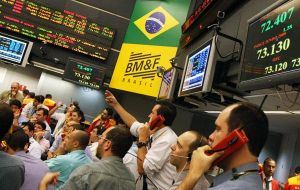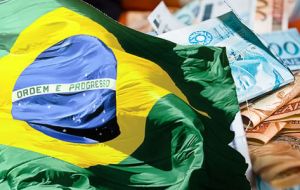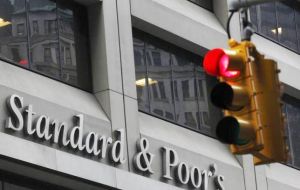MercoPress. South Atlantic News Agency
Brazilian Real falls to its lowest against the dollar since 2002; central bank injected funds
 Brazil’s benchmark stock index is down 20% over the past year and has dropped nearly twice that much since reaching a high in 2008.
Brazil’s benchmark stock index is down 20% over the past year and has dropped nearly twice that much since reaching a high in 2008.  Brazil's economy now appears to hang on the whims of a chaotic political system that relies on backroom favor-trading among a patchwork of political parties
Brazil's economy now appears to hang on the whims of a chaotic political system that relies on backroom favor-trading among a patchwork of political parties  S&Ps said a big reason for cutting credit rating is that government presented a 2016 budget that runs a deficit even before interest payments
S&Ps said a big reason for cutting credit rating is that government presented a 2016 budget that runs a deficit even before interest payments A day after Standard & Poor’s slashed Brazil’s credit rating to junk, the Brazilian Real lost close to 2% by the end of the day to 3.865 per dollar—its weakest level since 2002. In an effort to stem the decline, Brazil’s central bank injected $1.5 billion into the financial system Thursday.
The Real, among the worst performing currencies in the world against the U.S. dollar, has shed essentially all the gains of the long commodity boom that lifted Brazil’s economy and made it a darling for global investors.
The Standard & Poor’s downgrade late Wednesday was the latest stark reminder of Brazil’s dramatic economic downturn in the face of slowing growth from chief trade partner China, a key buyer of Brazil’s iron ore and other resources.
When Brazil achieved an investment-grade credit rating from the ratings agency in 2008, Brazilian leaders hailed the event as proof that the long volatile South American nation was graduating to higher standards of stability and prosperity.
But it was not to be. Instead, this week’s credit rating downgrade points to fundamental obstacles to growth that some investors overlooked as a windfall of rising commodity prices spurred global frenzy for investing in emerging markets. Brazil’s benchmark stock index is down 20% over the past year and has dropped nearly twice that much since reaching a high in 2008.
Brazil's economy now appears to hang on the whims of a chaotic political system that relies on backroom favor-trading among a patchwork of political parties that have little in common beyond the desire to increase their power bases.
Analysts say that culture of dividing power helped spawn a plus $2-billion kickback scheme at the state-owned oil company Petrobras. Dozens of corporate executives and politicians from the ruling Workers’ Party and its allies have been jailed. On Thursday Standard & Poor’s also lowered Petrobras’s credit rating two notches to junk status.
Standard & Poor’s lead sovereign ratings official said a big reason it cut Brazil’s credit rating is that the government has presented a 2016 budget that runs a deficit even before interest payments—despite vows from its officials to close up spending shortfalls and give the government more of a cushion to pay off its rising debt.
“The budget that was tabled last week, in our view, signaled a change,” Lisa Schineller, managing director on the sovereign ratings team at S&P. “It was a change in our view of likelihood of cohesion, moving forward with a solid plan.”
Brazil’s budget deficit in the year ended July 31 approached a dizzying 9% of GDP, nearly triple the shortfall in 2013.
Ratings firm Standard & Poor’s cut Brazil’s debt rating to junk-grade BB+. The other two main ratings agencies, Fitch and Moody’s Investors Service, both still rate Brazil as an investment-grade credit. That is important because some large investment funds are required to sell securities if two agencies rate it junk.




Top Comments
Disclaimer & comment rules-

-

-

Read all commentsI've been saying this for a long time. Brazil should cut all ties with the United States, including diplomatic. With Western Europe continue to maintain a neutral policy as they remain vassals of the US interests.
Sep 11th, 2015 - 10:54 am 0The West is a speculative bubble that live appearances. Our path to prosperity is in BRICSA, South America and the Caribbean, Asia, Africa and part of Oceania.
The loss of investment grade does not affect us at all. Our foreign currency debt is negligible, less than 7% of GDP. Also Brazilian companies use the BNDES as long-term funding source, rather than the international banks.
If the loss of this grade Western investment came in a financial bind the time Brazil was in a bad situation now. So we should not trust the West. We must say no to its currency, its sources of funding, its arms industry, its companies, its culture, etc.
We must support and act for greater integration of the South. Definitely separate the wheat from the chaff. And say NO to the Western way of life, where speculation and bubbles and sovereign debt are eternally priceless and which can only continue to exist because BRICSA continue to use the dollar for most of its trade and international reserves.
We, from South, should stop financing debt and speculation in the West.
https://www.youtube.com/watch?v=0pjxrglK1tI
@1 The Brasileiro Gang
Sep 11th, 2015 - 01:13 pm 0Of course the are affected by the loss of investment grade. Junk status means less investment - you desperately need it; money leaving your country - you desperately need it; higher cost of borrowing - you definitely don't need that.
I explained in detail why you should not be hanging all hope on the BRIC (S). The idea of the BRIC countries as long term EMERGING markets was coined by an economist at Goldman Sachs written in a paper in 2001. It predicted the four countries as possible EMERGING markets in 2050. Got that? 2050. It is a long way off. People picked up this idea and ran with it to mean they would be the new super powers NOW.
Since 2001 a lot has changed and now three of the four countries are in the shit. Only INDIA is still a good long term investment opportunity. The new I (S).
The US is still the only economic superpower, like it or not. So your dream of isolation from the biggest markets will only damage your already fragile economy. Thankfully, the people running your country do not share your ideals. They used boom times as an opportunity to steal as much as they could, but they understand that trade = wealth.
@2
Sep 11th, 2015 - 05:09 pm 0A country that produces 15 trillion dollars a year and has printed 4.5 quadrillion dollars can not be even considered power. USA is leveraged far beyond its capacity to react. United States is a sand castle on the beach.
https://www.youtube.com/watch?v=9dEhj6iz8PE
Commenting for this story is now closed.
If you have a Facebook account, become a fan and comment on our Facebook Page!